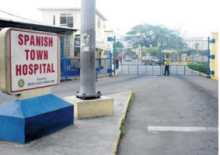From all accounts, after the abolition of user fees, patients poured into these facilities in search of treatment. It was reported in the first year after the fees were abolished that 16 per cent more patients were seen. The big question today, however, is this: Has the abolition of user fees improved equitable access to quality health services? If we listen to the assessment of Spanish Town Mayor Norman Scott, the answer is a resounding no.
He had this to say recently: “People go to hospital and they spend days on a bench before actually getting a bed. In some cases, before they get a bed, they have to go elsewhere to get scans and other tests done, because they are not available at public hospitals.”
Additionally, a nationwide survey of public hospitals carried out by the Caribbean Policy Research Institute (CAPRI) points to the loss of financial resources which have negatively affected pharmaceutical and medical supplies, staffing, waiting time, space, service delivery and processing time.
This survey shows up some of the unintended consequences of the abolition of user fees. It seems that the switch was not as easy as anticipated back in 2008. The announcement of free healthcare was heartily welcomed as a smart political move. But, after the announcement, it was then left to the ministries of health and finance to provide the requisite resources for the key components necessary to deliver a properly run, national healthcare system.

